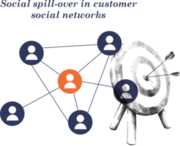The power of online communities is incredible, as proven by Wikipedia, Linux, and other success stories. “Open-source software development creates products that are as good (some say, even better) as those created by traditional software companies with tens of thousands of employees,” says Sri Kudaravalli, who studies how information technology is facilitating large-scale, distributed, knowledge collaboration. Indeed, online communities can be the source of tremendous knowledge creation, with volunteers from around the world sharing tips on photography and other technical hobbies, digitalizing books, or even helping NASA map craters on Mars.
Companies are keen to leverage these networks to develop their products. For instance, in 2013, the market research company Forrester reported a 25% increase in the usage of online communities dedicated to customer service over the past three years.
Exploring online leadership
How do online communities, whose members are scattered across the globe, work so successfully without formal control structures? While traditional organizations rely on hierarchy and other control mechanisms, online communities are loosely coordinated, self-organizing, and voluntary. Some observers have labeled online communities “leaderless organizations.” Therefore, when Sri Kudaravalli and his co-authors Samer Faraj and Molly Wasko began their research, it was unclear whether leadership existed at all in online communities. While other studies subsequently uncovered some insights, such as how individuals move from the periphery to the core, Sri Kudaravalli and his colleagues developed an integrated framework to study leadership in online communities.
In 2013, the market research company Forrester reported a 25% increase in the usage of online communities dedicated to customer service over the past three years.
Traditional leadership theory posits that leaders assign tasks and manage relationships, while other research shows that influential members occupy central positions in the organizational structure. The researchers set out to discover whether similar ideas also apply to online communities. To gather data, they surveyed users and studied messages from three online communities focused on technical topics related to programming, examining both the behaviors and structural position within the networks of those identified by other participants as leaders.
Leaders are expert contributors
The researchers’ findings indicate that leaders are mainly distinguished by their task-based behaviors. They contribute knowledge by answering queries, sometimes sharing programming code, and giving personal assessments. Tenure (duration of membership) and participation were positively associated with being identified as a leader, but the number of questions asked by a participant had a negative association, which indicates that a leader is more likely to provide answers than questions. The researchers also rated postings for the existence and frequency of sign-offs, thanks, and personal anecdotes — signs of sociability within online communities — and found that sociability was less significant than knowledge contribution.
However, Sri Kudaravalli warns not to conclude based on this finding that sociability is unimportant in all online communities, just that it is not as important as knowledge contribution in the communities studied, which are all dedicated to sharing technical expertise. Sri Kudaravalli explains that in technical forums, such as those dedicated to programming, there are, often, correct and incorrect answers to questions; on the other hand, in online communities organized around social support or political action, relationships and sociable behavior of influential members may be valued more.
Leaders are better connected
The researchers complemented their behavioral approach with a structural approach, using the concept of social capital, or resources accessed by virtue of relational ties. In traditional bricks-and-mortar organizations, members in key positions can gather information from unconnected groups and trade off on it. The researchers wondered whether a similar edge could be gained online. After all, in the context of knowledge collaboration, information is key, and an individual who “bridges” unconnected parts of the network benefits from arbitrage opportunities. By constructing a matrix of ties between who responded to whom in the online community, the researchers did indeed find that structural social capital was strongly associated with leadership.
However, Sri Kudaravalli says there is no way to tell, based on their study, whether the members identified as leaders achieved their structural position because of their leadership qualities, or if it was the other way around — if they developed their leadership qualities as a result of their structural social capital. He and his colleagues found a strong interaction effect: the likelihood of a central participant being identified as a leader was greater if they also engaged in knowledge contribution and sociable behavior. They also found that leadership is a lot more concentrated than expected: out of nearly 1,000 participants in the study, only 42 were identified as leaders, while fewer still (8), were nominated 9 or more times!











